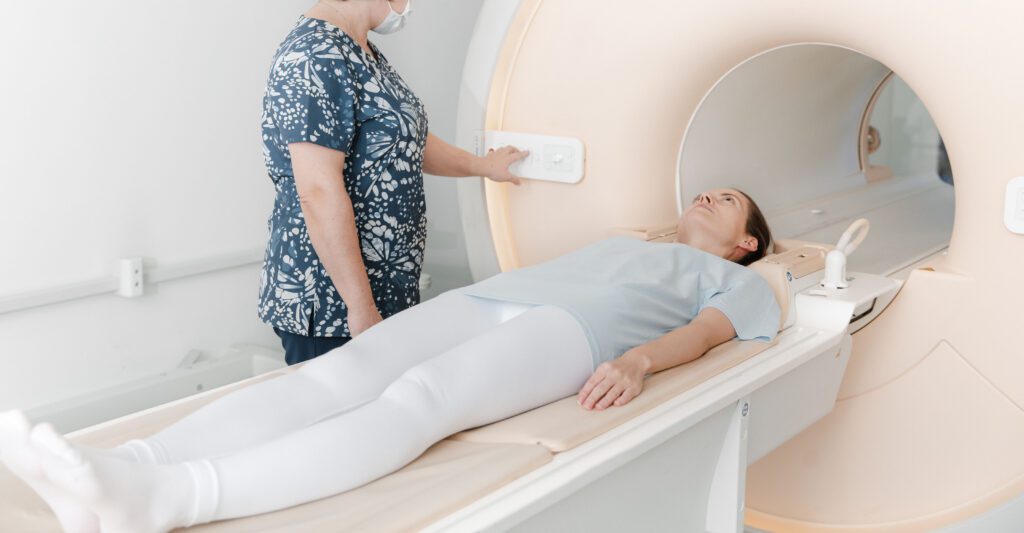When your doctor recommended a brain MRI for you or your loved one, you may have felt a little worried or anxious, which is understandable. But getting a brain MRI doesn’t have to be stressful for you.
If you understand what to expect from your brain MRI, you’ll feel more prepared and comfortable on the day of your scan. Knowing the process ahead of time can help you feel at ease during the appointment.
In this article, we’ll show you how to get ready for your MRI appointment, what to expect during and after your brain MRI, and how to understand your MRI results. Let’s take a closer look at brain MRI scans.
What to Know to Prepare for Your Brain MRI
How should I dress for my brain MRI scan? What should I avoid wearing?
It’s important to wear comfortable, loose-fitting clothes for your brain MRI scan. Many people choose to wear soft, cotton clothing, like a t-shirt and sweatpants for maximum comfort.
Metal items can interfere with the MRI machine, so you’ll want to avoid wearing any clothing with zippers, snaps, or metal buttons. You should also leave at home any jewelry, watches, or any other accessories containing metal. If you wear glasses, you’ll be asked to take them off just before the scan, as well.
If you have any medical implants or metal in your body, like pacemakers, metal plates, or screws, be sure to let your MRI technologist know, so they can take the proper precautions to ensure your safety.
Is it OK to eat and drink as normal before a brain MRI?
You should be sure to follow your doctor’s instructions. For most brain MRI scans, you can continue to eat and drink as you normally would, unless your doctor has given you specific instructions otherwise.
Should I keep taking my medication or supplements as usual before my scan?
As for medications and supplements, many people getting an MRI can continue taking them as usual, but it’s a good idea to confirm this with your doctor before your scan. If you take certain medications for anxiety or pain, your doctor may have specific guidance for you, so it’s best to check in advance.
Why did my healthcare provider order contrast dye for my brain MRI?
In some cases, your doctor may order a brain MRI with contrast dye, which is a special dye that helps highlight certain areas of your brain more clearly on the MRI images. Contrast is often injected into a vein, and allows the radiologist to see enhanced details that may be important for diagnosing your condition.
Not everyone needs contrast for their brain MRI, but it’s often used if your provider wants to get a closer look at blood vessels, tissues, or possible abnormalities that could be causing your symptoms. Your doctor will tell you in advance if your brain MRI requires contrast.
What happens during a brain MRI scan
Understanding what happens during your brain MRI can help you feel more at ease, allowing for the best possible results. While a brain MRI may seem daunting at first, rest assured that your MRI technologist will be there to guide you through every step of the process.
How will I be positioned for the brain MRI scan?
For a brain MRI scan, you will be asked to lie down on a padded table that slides into the MRI machine. The table is designed to keep you comfortable and still throughout the scan. You’ll be positioned on your back, with your head resting on a cushion or support to help keep it steady. Once you are in position, the table will move slowly into the opening of the MRI machine, and your technologist will make sure you’re as comfortable as possible before starting your scan.

What will I experience during a brain MRI? How long does it take?
During a brain MRI, you’ll hear loud tapping, thumping, or humming noises from the machine as it captures images of your brain. These sounds are normal and simply part of the imaging process.
It’s important to stay as still as possible to ensure the images are clear. Your technologist will do everything they can to help you get accurate results. You’ll be inside the MRI machine for 30 to 60 minutes, depending on the type of brain scan your healthcare provider has requested and your specific needs.
How can I communicate with my MRI technologist during the scan?
While your MRI scan is happening, your technologist will be able to see and hear you, and you can use an intercom to speak with your MRI technologist at any time. If you need to tell them something, or if you need a break, simply speak up and they’ll be able to hear you.
What to expect after your brain MRI
Once your brain MRI is finished, your technologist will guide you through your next steps, including any necessary aftercare. Be sure to follow your doctor’s instructions for after your scan. We’ll walk you through exactly what you can expect once your brain MRI scan is complete.
After a brain MRI, can I go back to my daily routine immediately?
Yes, most people can go right back to their regular activities as soon as their brain MRI is complete. The day of your MRI appointment, you can plan to resume your day as you normally would, unless your provider or your technologist tell you otherwise.
If you’ve been given a sedative to help you relax during the MRI, you’ll need a little more time to recover. It will take an hour or so before your sedative wears off, so plan to spend a little longer at the imaging center, until it’s safe for you to leave. You’ll need to have someone to drive you home, and for the next 24 hours, avoid drinking alcohol and operating heavy machinery.
If my doctor ordered an MRI with contrast dye, what should I know about my aftercare?
Contrast dye is designed to be processed naturally by your body, and in most cases, it is filtered out through your kidneys. You may be advised to drink extra water after the scan to help flush the dye from your system.
If you have a history of kidney issues or known allergies to contrast dye, your doctor might give you specific aftercare instructions to follow. In rare cases, some people may experience mild side effects like nausea or a headache after receiving contrast dye, but these symptoms typically resolve quickly on their own.
After an MRI with contrast, if you experience anything out of the ordinary, you should contact your doctor for further guidance.
How to understand your brain MRI results
Following your MRI appointment, your radiologist and your doctor will analyze your brain MRI results, which your doctor will use to understand your condition or make a diagnosis. We’ll walk you through what to expect when reviewing your results, how long it might take, and the types of questions you can ask your doctor.
How are the results of my brain MRI scan interpreted?
The images from your brain MRI scan are interpreted by a radiologist who is trained to analyze MRI images. The radiologist will look closely at the detailed pictures of your brain, keeping an eye out for anything unusual, or any signs of injury. They will write up a report summarizing their findings, which will then be shared with your doctor.
Your doctor will go over the radiologist’s report with you, via a phone call, or during a meeting in person. They will explain what, if anything, the MRI has revealed and how these findings might relate to your symptoms. In some cases, your doctor may order additional tests or consultations based on your MRI results.
How long does it take to get brain MRI results?
It will take about a week to get your results, depending on your circumstances. This gives your radiologist enough time to carefully review the images, and to prepare a report, as well as for your doctor to receive your report.
If your doctor needs your MRI results urgently, then they may be able to expedite the process, so you can discuss the findings with them sooner. If you have any concerns about the timeline for your results, please feel free to contact your doctor, who can tell you more.
What are some questions I should ask my doctor about my brain MRI results?
When it’s time to discuss your brain MRI results with your healthcare provider, you should come prepared with a few questions, so you can ask about what’s important to your health.
Here are some helpful questions to ask your docotor about your brain MRI results:
- What did the MRI reveal about my brain? How does this relate to my symptoms?
- Are there any areas of concern that we need to investigate further?
- Do my results confirm a diagnosis, or point to any possible conditions?
- What are the next steps based on the results of my MRI?
- Will I need additional tests or scans in the future?
Remember, your doctor is there to help you make sense of the information, and guide you toward the best course of action. Be sure to ask them about what matters most to you.
How to schedule an MRI appointment with American Health Imaging
Reach out to us at American Health Imaging, and we’ll help you schedule an appointment at an imaging center near you, today.
We’re here to help you get the answers you need.
Frequently Asked Questions About Brain MRIs
Q: What should I wear to my brain MRI?
A: Wear comfortable, loose-fitting clothing, and avoid wearing anything with metal (like zippers or jewelry).
Q: Can I eat or take my medications before my brain MRI?
A: Most people can eat and take their medications normally, but check with your doctor for their specific instructions.
Q: Why would my doctor order contrast dye for my brain MRI?
A: Contrast dye is used to highlight certain areas of your brain more clearly on the images, for better diagnosis.
Q: How will I be positioned during a brain MRI?
A: You will lie on your back on a padded table, with your head supported to stay still, and the table will move slowly into the MRI machine.
Q: What will I experience during a brain MRI scan?
A: You will hear loud tapping or humming sounds from the machine, and the scan will last between 30 to 60 minutes.
Q: Can I speak with my MRI technologist during the scan?
A: Yes, you can use an intercom to talk to your technologist at any time during the scan.
Q: Can I return to my daily routine immediately after a brain MRI?
A: Most people can return to their regular activities immediately after the scan, except if given a sedative.
Q: How long will it take to get the results of my brain MRI?
A: It typically takes about a week to receive your results, but your provider may obtain your results more quickly, if needed.
